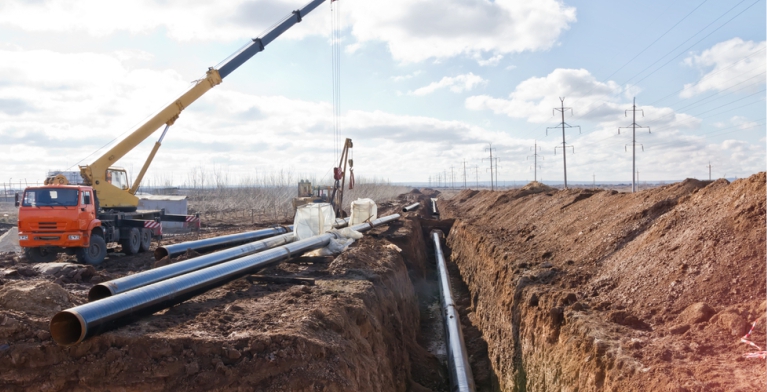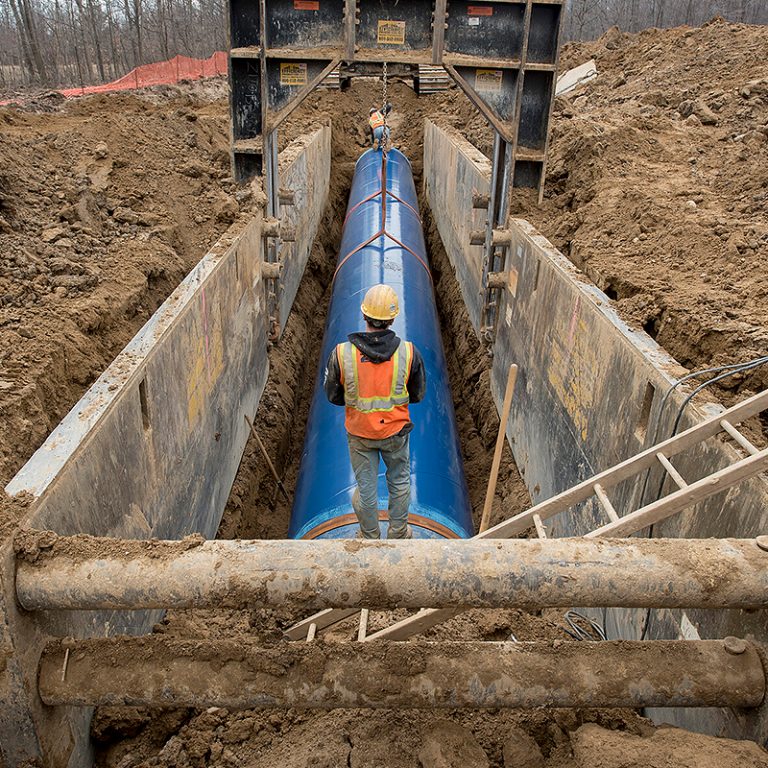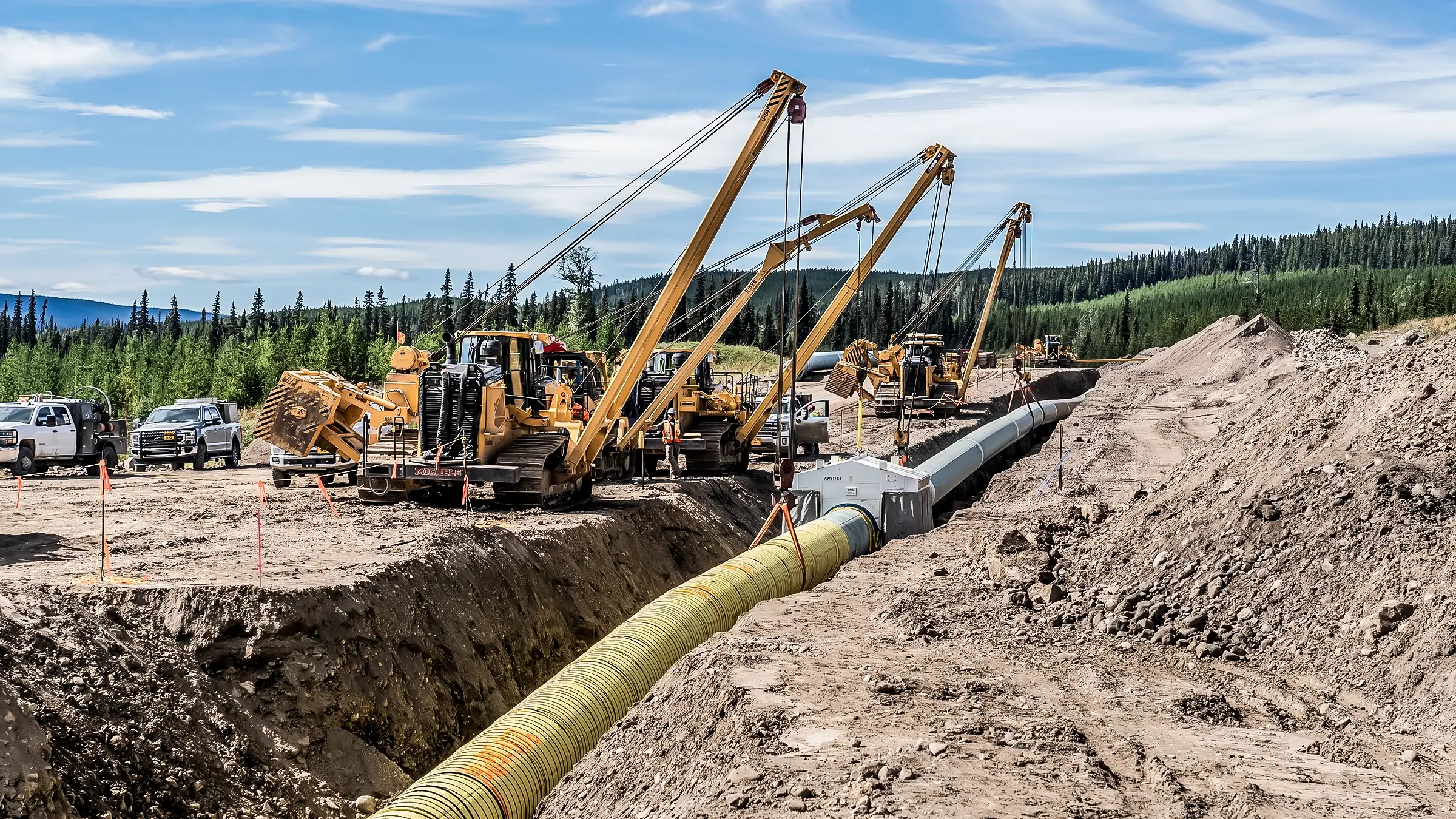Why Pipeline Construction Is Vital for Power Facilities Growth
Pipeline construction plays an important role in the development of energy infrastructure, offering as the backbone for the transportation of vital sources like oil and natural gas. This intricate network not only promotes efficient distribution however also boosts financial growth via task creation and local financial investment. Additionally, innovations in security modern technologies are dealing with environmental problems, placing pipelines as a cornerstone of lasting power methods. The intricacies surrounding pipe projects raise vital inquiries concerning regulative structures and their lasting influence on areas and environments. Checking out these measurements discloses a multifaceted story that necessitates mindful factor to consider.
Function of Pipelines in Power Supply
The vital role of pipelines in energy supply can not be overemphasized, as they act as the foundation of modern energy framework. Pipelines are crucial for the effective transport of numerous forms of power, consisting of oil, gas, and refined products. They assist in the motion of these sources from extraction websites to refineries and distribution facilities, guaranteeing that energy reaches customers in a timely manner.The construction of pipelines entails meticulous preparation and adherence to regulative criteria, showing the intricacies of the power market and ecological considerations. Effective pipeline networks are designed to decrease transportation times, minimize costs, and improve security, while additionally attending to prospective ecological impacts. The ability to carry large quantities of energy over fars away makes pipelines a favored option for energy firms wanting to enhance their supply chains.Moreover, pipelines contribute to energy security by expanding supply routes and sources. As worldwide power demands fluctuate, pipelines enable areas to access various energy supplies, mitigating risks related to reliance on single sources. This diversity cultivates competitive prices and maintains markets, which is important in a significantly interconnected global economy.In enhancement to their logistical benefits, pipelines sustain local economies by developing jobs during construction and maintenance phases. The presence of a robust pipe framework likewise brings in investments in energy jobs, additionally enhancing regional advancement. Ultimately, pipelines are vital to the energy market, providing a trusted and effective means of transport that underpins economic growth and sustainability.

Advantages of Efficient Transport
Reliable transport via pipe systems supplies substantial advantages, consisting of decreased transportation costs and enhanced shipment speed. These benefits not only enhance the general business economics of power circulation yet likewise play an important duty in lessening the environmental impact connected with power transportation. As energy needs remain to increase, the relevance of enhancing transport methods becomes significantly obvious.

Decreased Transportation Prices
Lowered transportation prices stand for a significant benefit in the domain name of energy framework development. The construction of pipelines offers an extra financially feasible means of moving power resources compared to alternative approaches such as trucking or rail transport. Pipelines, when established, enable the continuous flow of oil, gas, and various other items over long distances with marginal functional costs.One of the primary reasons for minimized transportation expenses is the effectiveness of pipe systems. They can deliver huge volumes of products at the same time, thus spreading repaired costs over a better quantity of product. This mass transport ability notably lowers the expense each, making power resources more cost effective for customers and organizations alike.Additionally, pipelines reduce the risks and prices connected with handling and keeping volatile products. Unlike rail or roadway transport, which can sustain delays and damages, pipelines provide a safer and more constant technique of power conveyance. As a result, this integrity enhances the financial usefulness of power tasks, enabling for far better prices structures in open markets. Ultimately, decreased transport expenses cultivate an even more lasting power sector, promoting wider access and encouraging investment in more advancement.
Enhanced Delivery Speed
Pipelines considerably improve shipment rate in power transport, supplying an important advantage over traditional approaches such as trucking or rail systems. The constant circulation of materials with pipelines permits for a constant and efficient transport process, minimizing delays connected with loading and discharging. This constant activity is especially essential for energy sources, where demand can rise and fall rapidly.Moreover, pipelines can run all the time, untouched by traffic problems or weather-related disturbances that can restrain road or rail transport. This reliability ensures that power items get to consumers promptly, supporting functional requirements and boosting economic security. Additionally, the scalability of pipeline systems helps with the handling of huge volumes of power, which is essential for meeting the growing requirements of markets and domestic sectors.Furthermore, the integration of sophisticated monitoring and control innovations in pipeline systems enhances the shipment process. These developments permit real-time monitoring of circulation prices and system stress, assuring that any type of potential concerns are resolved without delay. On the whole, the boosted distribution rate provided by pipelines is a considerable variable in enhancing power infrastructure and assuring that supply chains continue to be robust and receptive to market demands.
Ecological Impact Factors To Consider
The benefits of speedy energy transport expand past logistical benefits; they also incorporate significant environmental considerations. Efficient pipe systems enable for the transportation of power sources with minimal disturbance to communities compared to alternate approaches such as truck or rail transportation. Pipelines can help with the motion of oil, gas, and other products in an extremely concentrated way, which reduces the carbon impact connected with power distribution.Moreover, pipelines are made with sophisticated safety and monitoring innovations that substantially reduced the danger of spills and leakages. An efficient pipeline facilities reduces the need for constant transport tasks, which can lead to lowered greenhouse gas exhausts gradually (Midland Pipeline Construction Authority). The capability to transfer energy sources straight to customers lowers dependence on even more polluting transport methods, further profiting air quality.In enhancement, tactical pipe placement can help preserve delicate habitats by following existing passages, thereby reducing the influence on wildlife and all-natural landscapes. In general, the construction of pipelines not only supports power infrastructure growth but likewise supplies an ecologically responsible means of delivering energy, adding to a much more sustainable future
Economic Impact of Pipeline Projects
The economic influence of pipe tasks extends beyond mere transportation effectiveness, significantly influencing local and regional economic climates. These initiatives produce work opportunities during both construction and continuous operations, promoting community development (Pipeline Construction Authority). Additionally, the stimulation of financial growth via increased investment and framework enhancement is a vital advantage of pipe construction
Work Production Opportunities
While energy framework tasks usually face scrutiny, they present considerable task creation opportunities that can favorably impact regional economic situations. Pipeline construction projects require a diverse series of skilled labor, consisting of engineers, job managers, and specialized specialists, in addition to inexperienced laborers for numerous roles. This complex demand for labor can result in the creation of countless work throughout the construction stage and usually results in long-term job opportunity once the facilities is operational.In enhancement to direct work, pipe jobs boost neighborhood economic climates by generating secondary task chances in sectors such as transportation, production, and friendliness. Regional organizations take advantage of enhanced need for products and services, adding to total economic wellness. Additionally, the influx of workers can result in raised tax earnings for local federal governments, which can be reinvested in community solutions and infrastructure.Moreover, pipe construction tasks usually prioritize working with neighborhood employees, cultivating a sense of area investment and support. By connecting the space in between energy supply and demand, these projects not just enhance power protection however likewise work as catalysts for economic development, reinforcing the relevance of pipe construction in work production initiatives.
Economic Growth Stimulus
Pipeline projects offer as an effective financial development stimulation, driving substantial investments right into regional and regional economies. The construction and operation of pipelines produce a ripple result, creating demand for products, devices, and solutions (Texas Pipeline Construction Excellence). This influx of capital supports neighborhood companies, from producing to friendliness, fostering a robust economic environment.Moreover, these projects produce significant tax earnings for districts and states, which can be reinvested in public solutions, framework improvements, and neighborhood growth initiatives. The economic benefits prolong beyond prompt work development, as experienced labor is typically required for ongoing maintenance and operations, making sure long-term employment opportunities.Additionally, the improved power infrastructure promotes the effective transportation of sources, potentially decreasing energy costs for customers and organizations alike. By boosting energy accessibility, pipelines can attract new industries and stimulate growth in existing fields, useful site contributing to total financial diversity
Environmental Considerations and Innovations
Harmonizing power requires with ecological integrity comes to be significantly essential as pipe construction expands. The search of reliable energy transportation need to make up environmental influences, requiring ingenious techniques and modern technologies that minimize environmental disruption. Modern pipe projects are progressively incorporating innovative environmental analyses at every stage, guaranteeing that potential threats are recognized and minimized early in the planning process.One significant technology in this field is the fostering of trenchless modern technology, which enables the installment of pipelines without extensive surface area disturbance. This method decreases environment fragmentation, protects existing environments, and minimizes the carbon footprint connected with traditional excavation techniques. Additionally, real-time monitoring systems equipped with sensing units make it possible for drivers to discover leaks or ecological changes rapidly, consequently facilitating timely actions to prospective hazards.Moreover, the consolidation of environmentally friendly materials and construction methods is gaining traction. Naturally degradable exploration liquids and corrosion-resistant finishes can significantly decrease the ecological impact of pipe jobs. Business are also committing to recovering habitats post-construction, utilizing indigenous plant varieties to assist in community recovery.Collaboration with ecological firms and local communities is essential - Pipeline Construction Authority. Engaging stakeholders in the decision-making process promotes openness and promotes sustainable methods, making certain that energy framework growth aligns with environmental stewardship
Challenges in Pipeline Construction
In the middle of the growing need for power framework, different difficulties complicate the construction of pipelines. Among the main concerns is the geographical irregularity of pipeline courses, which can go across varied landscapes, consisting of mountains, rivers, and urban areas. Each setting calls for tailored design options to attend to environmental management, geological stability, and logistical constraints.Additionally, the general public perception of pipeline jobs commonly postures a considerable obstacle. Regional areas might share problems regarding prospective environmental effects, safety and security threats, and disruption throughout construction. This resistance can cause hold-ups, increased prices, and the necessity for extensive area interaction techniques to cultivate acceptance.Moreover, labor shortages in competent trades better make complex pipeline construction initiatives. As the need for power infrastructure grows, the availability of experienced employees lessens, which can result in project delays and boosted labor expenses. The pipe market need to purchase workforce advancement initiatives to grow a knowledgeable labor swimming pool capable of meeting the progressing demands.Safety stays a vital concern throughout the construction procedure. The market faces the difficulty of ensuring that all safety and security procedures are followed, as also minor gaps can lead to significant mishaps. This requires rigorous training and oversight to maintain operational integrity.Lastly, rising and fall product prices can influence task budget plans and timelines. The requirement for high-grade materials, combined with market volatility, requires cautious financial planning and risk mitigation approaches to maintain tasks on course. Attending to these obstacles is necessary for the successful and effective construction of pipelines as component of a durable energy framework.
Regulative Framework and Compliance
The regulative framework regulating pipeline construction is complex and complex, calling for compliance with a selection of federal, state, and local policies. At the government level, firms such as the Federal Energy Regulatory Payment (FERC) and the Pipeline and Hazardous Materials Security Management (PHMSA) play important roles in overseeing pipe projects. FERC regulates the transportation of all-natural gas and oil, authorizing projects based upon economic requirement and public rate of interest, while PHMSA concentrates on security requirements and the stability of pipeline operations.State policies can differ substantially, with specific states enforcing their very own allowing procedures, security regulations, and environmental analyses. For example, state public utility commissions may anchor require extra examination of suggested courses to guarantee very little disruption to communities and ecological communities. Compliance with the National Environmental Plan Act (NEPA) is likewise essential, mandating comprehensive ecological impact analyses before project approval.Local policies might additionally complicate the compliance landscape, as municipalities usually have details zoning regulations, land use laws, and community interaction needs. Engaging with neighborhood stakeholders is not just a governing need but additionally an ideal technique to assist in smoother project execution.Moreover, the regulatory landscape is constantly advancing, influenced by public sentiment, technological developments, and ecological plans, demanding continuous watchfulness from pipe drivers. Steering via this complex regulative framework is crucial for confirming that pipe construction tasks are not only lawfully compliant yet likewise socially accountable and eco lasting, thus contributing to the total effectiveness of power framework growth.
Future Patterns in Pipeline Infrastructure
A substantial transformation is underway in pipeline infrastructure, driven Professional Oilfield Services Texas by improvements in technology, progressing power needs, and raising ecological awareness. As the international energy landscape shifts in the direction of sustainable sources, pipeline systems are adjusting to accommodate diverse energy types, including gas and biofuels, while likewise integrating more advanced tracking and safety and security technologies.One noteworthy trend is the incorporation of digital services, such as Internet of Points (IoT) tools and man-made knowledge (AI), which boost real-time tracking and predictive upkeep capabilities. These developments not only enhance operational effectiveness but also substantially minimize the risk of leaks and mishaps, making certain better environmental management. Additionally, using sophisticated products, such as composite pipes, is acquiring grip due to their sturdiness and resistance to rust, more prolonging the lifespan of pipe systems.Moreover, the emphasis on sustainability is motivating the development of greener construction methods. Techniques such as trenchless technology decrease land disturbance and ecological effect, aligning pipe tasks with modern ecological requirements. In addition, regulative frameworks are progressing to promote openness and liability in pipeline procedures, ensuring stakeholders are a lot more notified concerning prospective threats and advantages.
Regularly Asked Concerns
Just How Do Pipelines Contrast to Various Other Transportation Techniques for Power Resources?
Pipelines use an affordable, effective, and eco-friendly approach for transferring power sources contrasted to options like vehicles and trains, which usually sustain higher operational expenses, greater land usage, and boosted greenhouse gas emissions. - Pipeline Construction Excellence

What Products Are Commonly Used in Pipeline Construction?
Typical products utilized in pipe construction include carbon steel, stainless steel, and plastic compounds. These products are selected for their strength, resilience, corrosion resistance, and suitability for various environmental conditions and kinds of carried power sources.

Just how Long Does It Normally Take to Construct a Pipe?
The duration for pipe construction varies substantially based on factors such as size, surface, and regulatory requirements. Usually, it can range from a number of months to a few years, depending on task intricacy and ecological factors to consider.
That Are the Secret Stakeholders in Pipeline Projects?
Secret stakeholders in pipeline projects include government firms, governing bodies, power companies, ecological organizations, local communities, and landowners - Professional Oilfield Services Texas. Each team plays a crucial duty in preparation, permitting, construction, and recurring operations of pipe facilities
What Are the Primary Precaution Throughout Pipeline Construction?
During pipe construction, key precaution include extensive site assessments, adherence to governing requirements, complete training for employees, making use of personal protective tools, and continuous tracking of environmental conditions to reduce dangers and assure functional safety and security.
Comments on “Key Reasons Pipeline Construction Excellence Drives Sustainable Infrastructure”